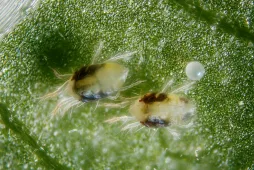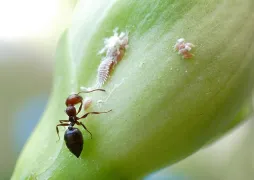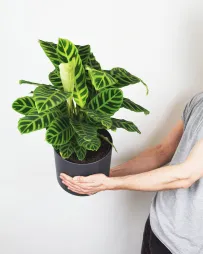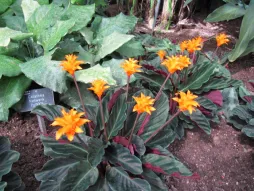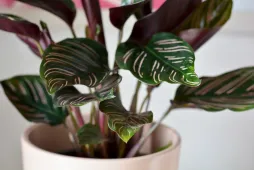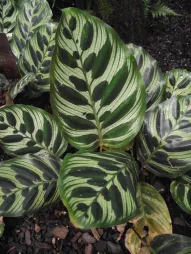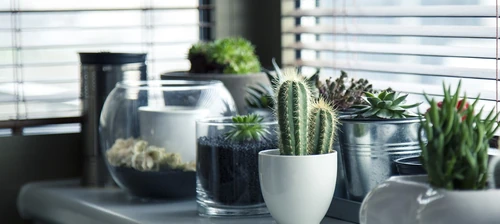Goeppertia lancifolia, a houseplant with spectacular foliage
Goeppertia lancifolia comes straight from Brazil and its tropical forests, and belongs to the Marantaceae family. It has seduced gardeners the world over with its graphic, hand-painted foliage. In our latitudes, it is grown as a houseplant.
How to recognize Goeppertia lancifolia?
Like goeppertia crocata, Goeppertia lancifolia or Goeppertia insignis is a perennial with a dense, bushy habit. When fully grown, it can reach a height of 75 centimetres.
As its name suggests, its leaves mimic the shape of a spear. Long and slender, they have wavy edges and measure up to 45 centimetres in length. The light-green blades are adorned with dark-green, almost black spots on either side of the midrib. This contrast is enhanced by the purple underside of the leaf. Goeppertia lancifolia is sometimes referred to as the "Rio Peacock" because of the peacock-feather-like pattern of its foliage. In reality, it's goeppertia makoyana, with its oval leaves, that best deserves the title of peacock plant.
In the wild, Goeppertia plants flower every year. Indoors, however, the phenomenon is less common. However, small, spikes of light-green flowers may appear in spring.
If you listen carefully, you may hear a gentle rustling as the sun sets. This is your Goeppertia getting ready for the night: every evening, the plant folds its leaves in half to protect them from nocturnal parasites. This habit, which it maintains in our homes, has earned it the nickname of "prayer plant".
Our maintenance tips
Not very demanding, your Goeppertia lancifolia is content with a location without direct sunlight and plenty of humidity.
Watering
Goeppertia lancifolia can withstand neither drought nor excess water.
Before watering, check the condition of the potting soil. The surface must be at least one centimeter dry.
Before watering, check the condition of the potting soil. The surface must be at least one centimeter dry.
Spray
In nature, goeppertia lancifolia benefits from a high degree of humidity. Spray your Calathea lancifolia withrainwater to improve humidity and prevent pest infestation.
Don' t use hard water, such as tap water. It leaves white spots on the foliage.
Repotting
Every spring, repot your Goeppertia lancifolia to give it more space.
Obtain a pierced pot of a larger size than the previous one. Don't hesitate to choose a ceramic or plastic model. These materials retain moisture and allow you to space out watering. Your Calathea lancifolia also prefers a wide pot to a deep container to give it room to grow.
Line the bottom with gravel or clay balls for drainage. Then pour in potting soil for green plants. You can lighten it by adding perlite.
Plant your subject in the middle and fill in with substrate. Water for the first time to eliminate air bubbles and encourage rooting.
Fertilization
To promote the growth of your Goeppertia lancifolia, apply fertilizer in spring and summer.
During the growing season, feed your Goeppertia lancifolia with a green plant fertilizer.
Cleaning
Dust on the leaves slows down photosynthesis and hinders your plant's growth. Clean foliage with a clean, damp sponge. This operation also helps prevent invasions by mites and other pests.
Prune
Remove wilted leaves usinga clean, sharp tool.
Cutting
Cutting is carried out during the strong growth phase, generally in spring and early summer.
Take advantage of repotting to divide your Calathea lancifolia. Once your plant has been dug up, locate a rhizome with one or more stems. Each stem should have at least three leaves.
Using your hands or a clean, sharp tool, separate the rhizome from the rest of the plant.
In a pierced pot, pour a drainage layer (clay balls or gravel, for example).
Add potting soil for seedlings and plantations. Plant your graft in the substrate. To help you, you can use a pen to make a pilot hole.
Water for the first time to eliminate air bubbles and encourage rooting.
Diseases / Threats
Information
| Family | Marantaceae - Marantaceae |
| Type | Goeppertia - Goeppertia |
| Species | Goeppertia lancifolia - Goeppertia lancifolia |
| Lifecycle | Perennial |
| Foliage | Evergreen |
| Exposures | |
| Substrat | |
| Planting method |
In pots |
| Categories | |
| Tag |
Soiffarde |
| Origin |
South America |
| Hardiness (USDA) | 12a |
| Leaf color |
|
| Flower color |
|
Discover plants from the same family













